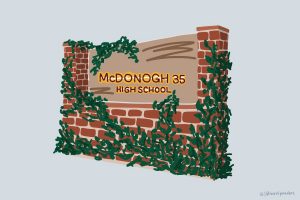The Charter that ate the South
January 23, 2019

The debate over charter schools has been raging for years now. With Trump’s nomination — and later confirmation — of Secretary of Education Betsy Devos, it seemed that the domination of charter schools was looming on the horizon. This proved to be the case. A year later, with a 5-2 vote from the Orleans Parish School Board over winter break, New Orleans became the first major city with a district predominantly comprised of charter schools.
The National Wildlife Federation defines an invasive species as “any kind of living organism—an amphibian (like the cane toad), plant, insect, fish, fungus, bacteria, or even an organism’s seeds or eggs—that is not native to an ecosystem and causes harm. They can harm the environment, the economy or even human health. Species that grow and reproduce quickly, and spread aggressively, with potential to cause harm, are given the label ‘invasive.’”
With a bit of interdisciplinary thought, why couldn’t the same definition be applied to charter schools? Even further, couldn’t we compare charter schools to an infamous invasive vine that has torn apart the southern region of the country after being introduced at a New Orleans exposition in 1884? Specifically, kudzu.
The perennial vine grows very rapidly. The Kudzu’s tendency is to grow on and over native plants, killing any and every native plant in its path of endless growth. Charter schools—like their botanical counterpart—have done quite a bit of the same. As public schools have failed, charter schools simply take over control of the public schools it devours in their wake.
Kudzu and charter schools alike are hard to hold accountable. As kudzu have no natural predators, charter schools have a lack of oppositional control at the local level. According to the National Education Association, “Charter school boards are appointed rather than elected,” and are therefore susceptible to “weak oversight and a lack of transparency … because charter schools have been exempted from rules designed to protect students, families, communities, and taxpayers.”
As the ever-invasive charter school continues to spread its progeny across the United States, it is hard not to think of the exact method by which kudzu kills other plants. With its quick vines, the plant swallows its opponent whole and suffocates it, growing strong enough to uproot trees. As charters continue to spread their vines across our country, one might fear that they could eventually uproot the entire education system. Proper measures must be taken to protect public schools in order to prevent this.









Bob Stefani • Jan 25, 2019 at 12:40 pm
The facile “invasive species” analogy in this post bears no relation to reality. The outstanding record of public charter schools in achieving positive results for New Orleans students is evident in the numbers: Current high school graduation rate of 73 percent, compared to 54 percent in 2004; just 11 percent of Orleans Parish students attend the lowest-performing schools, compared to 62 percent when the Katrina hit. Public charter schools are accountable to the Orleans Parish School Board in that the school operator will lose its charter to operate the school if it fails to meet benchmark academic, financial and governance goals. Additionally, under the charter system, parents always have the option to choose a different school if they do not like the one their kids are attending. This is a vast improvement over the system that existed before charters when failing public schools were allowed to continue to operate without consequence to the school operators and to the detriment of the kids who were forced to attend those schools. I understand this is the “Views” section of the paper, but shouldn’t the views expressed be based on facts?
Ted Plaster • Jan 25, 2019 at 10:37 am
Tell me why we are trying to protect non-functioning public schools and their unions from competitors that do a better job for the students?
Please don’t confuse NEA talking points with journalism.